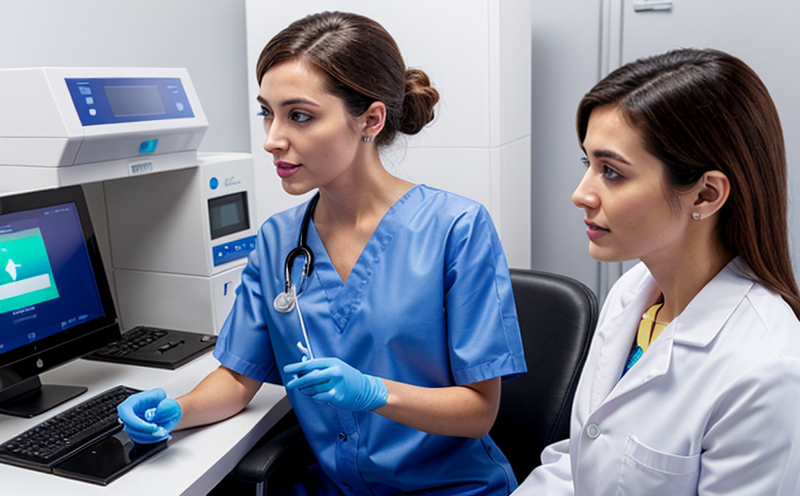PCR Testing for Environmental Aspergillus Species in Air Samples
The detection and quantification of environmental Aspergillus species through PCR testing are critical steps in ensuring the safety and health of individuals, especially those prone to respiratory issues. Aspergillus is a genus of fungi that can produce allergens, toxins, and infections, particularly affecting immunocompromised individuals such as patients undergoing chemotherapy or those with cystic fibrosis.
The PCR method is highly sensitive and specific in identifying the presence of Aspergillus species in air samples. This technique involves several key steps: sample collection, DNA extraction, amplification using primers specific to Aspergillus, and detection through gel electrophoresis or real-time PCR technology.
The use of real-time quantitative PCR (qPCR) allows for the precise quantification of Aspergillus species in air samples. This technique not only provides a definitive count but also helps in assessing potential exposure risks. The standard used is ISO 14695, which outlines the procedures for microbial air sampling and testing.
Our laboratory adheres to strict protocols to ensure accurate results. We employ state-of-the-art equipment such as thermocyclers from Applied Biosystems and DNA extraction kits following the guidelines of EN ISO 17025 for quality management systems in testing laboratories. The process ensures that each sample is handled with precision, minimizing contamination risks.
The significance of this test extends beyond mere detection; it plays a crucial role in environmental monitoring and control measures. By identifying the presence of Aspergillus species early on, we can implement targeted remediation strategies to reduce airborne fungal spores. This proactive approach helps prevent potential health issues among building occupants.
The PCR testing for environmental Aspergillus species is particularly important in healthcare facilities, where patients with compromised immune systems are at higher risk. Regular monitoring of air quality ensures that these environments remain safe and hygienic. Compliance with standards such as ASHRAE 55-2017 and ISO 4818 further reinforces the importance of maintaining optimal environmental conditions.
The accuracy and reliability of our PCR testing services are underpinned by our experienced team of microbiologists and technicians, who possess extensive knowledge in molecular biology. Our commitment to quality is reflected in our adherence to international standards and certifications. This ensures that all tests conducted are not only precise but also reproducible.
In addition to the technical aspects, we understand the importance of clear communication with clients regarding test results. Our comprehensive reports provide detailed insights into the presence and concentration levels of Aspergillus species in air samples. These reports are crucial for stakeholders involved in facility management, environmental health professionals, and regulatory bodies.
Eurolab Advantages
At Eurolab, we pride ourselves on offering unparalleled quality assurance through our ISO 17025 accreditation. This ensures that all tests conducted are performed to the highest standards of accuracy and reliability. Our state-of-the-art facilities equipped with advanced PCR technology provide robust results.
We offer a range of services tailored to meet the specific needs of various clients, including hospitals, commercial buildings, and industrial settings. Our team of experts is committed to delivering timely and accurate reports that are crucial for making informed decisions regarding environmental management.
Our commitment to excellence extends beyond technical proficiency; we also focus on customer satisfaction by offering personalized support throughout the testing process. From initial consultation to final report delivery, our goal is to ensure a seamless experience for all clients.
We understand that every client has unique requirements and challenges. Our flexible approach allows us to adapt our services accordingly, whether it's through custom sampling methods or extended reporting options. This ensures that we provide the most effective solutions for addressing environmental concerns related to Aspergillus species.
Why Choose This Test
Choosing PCR testing for identifying and quantifying Aspergillus species in air samples offers several advantages over traditional sampling methods. Firstly, it allows for rapid detection of fungal spores, which can be critical in time-sensitive situations such as hospital outbreaks.
The specificity of the PCR test ensures accurate identification of different Aspergillus species, providing a more precise understanding of the environmental conditions. This information is invaluable for implementing targeted remediation efforts and ensuring compliance with regulatory standards.
Patient safety is paramount in healthcare settings, where even low levels of airborne fungal spores can pose significant risks. Regular monitoring through PCR testing helps maintain a safe environment by identifying potential hazards early on. Compliance with stringent health and safety regulations such as ASHRAE 58-2019 ensures that facilities adhere to the highest standards.
The reliability of our tests is further enhanced by our use of advanced instrumentation and strict adherence to international standards like ISO 14695. This ensures consistent and accurate results across multiple samples, providing confidence in the efficacy of any remediation measures implemented.
Our services are designed to meet the diverse needs of various clients, from small-scale commercial properties to large healthcare facilities. By offering a comprehensive range of testing options, we ensure that every client receives the most suitable and effective solutions for their specific requirements.
Environmental and Sustainability Contributions
The detection and quantification of Aspergillus species in air samples through PCR testing contribute significantly to environmental sustainability efforts. By identifying sources of airborne fungi, this test aids in implementing effective remediation strategies that reduce the overall presence of harmful microorganisms.
This proactive approach not only enhances indoor air quality but also supports broader environmental health initiatives by minimizing public exposure to potentially hazardous substances. The use of PCR testing aligns with global sustainability goals, emphasizing the importance of clean and safe environments for all occupants.
The precision and reliability of our tests are critical in supporting evidence-based decision-making processes within various industries. Healthcare facilities, in particular, benefit greatly from this technology by ensuring patient safety and operational continuity. The integration of PCR testing into routine environmental monitoring programs reinforces the commitment to sustainable practices and compliance with international standards.
Our services play a vital role in promoting healthier living spaces by providing actionable insights that guide preventive measures and interventions. By identifying and addressing potential risks early, we contribute to creating safer, more sustainable environments for all stakeholders involved.





